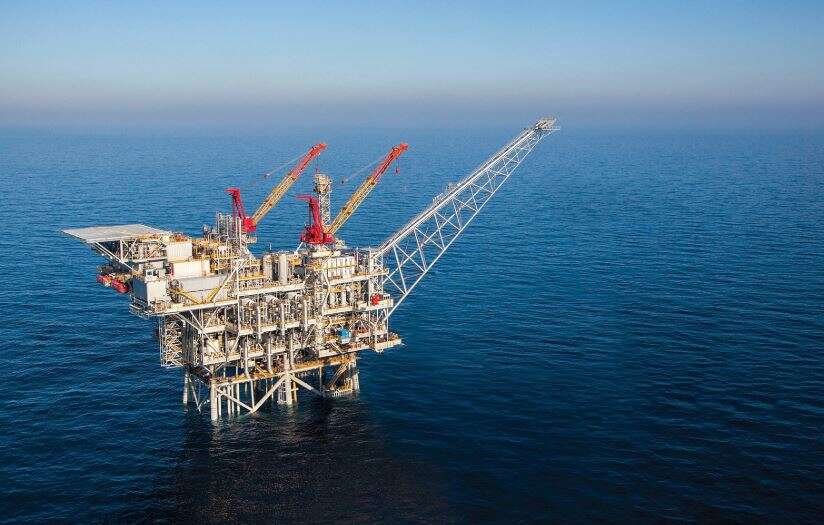Blue and white energy
Israel's collaboration with the American private sector has paved the way for the Israeli economy's energy independence, ushering in the natural gas revolution.
The rig at the Tamar offshore gas field | Photo: Albatross
The natural gas discoveries in Israel's economic waters include
several massive offshore fields: Leviathan, discovered in 2010 roughly 130 kilometers (81 miles) west of Haifa, which holds an estimated 22 trillion cubic feet of natural gas; Tamar, discovered some 80 kilometers (50 miles) west of Haifa in 2009, which is believed to have reserves of up to 8.4 trillion cubic feet; and the Tanin and Karish gas fields, discovered in 2012 some 120 kilometers (74 miles) northwest of Haifa's shores, which are believed to hold about 1.3 trillion cubic feet of natural gas each.
These discoveries are the result of a historic collaboration between the American and Israeli private sectors, which has radically changed the global position of the Israeli energy market. Israel went from being a state struggling to meet its energy needs by importing oil and other energy sources, to a country with enormous energy output that exponentially exceeds its needs.
The completion of the development of the Tamar gas field in 2013 ushered in the natural gas revolution in Israel. It was during this year that widespread use of natural gas became a part of the electricity generation process, and large and medium-sized industrial plants began to consume local, cheap and clean natural gas instead of costly and polluting petroleum distillates.
This breakthrough enabled Israel to wean itself from historical dependence on energy imports, and it is doubtful whether it could have become a reality if not for Israel's collaboration with the American private sector.
The results of the revolution were not long in coming: According to data from the Energy Ministry, since natural gas production began at Tamar, it has saved the economy a staggering 46 billion shekels ($13 billion) in energy costs alone. This has translated into a steady reduction in the price of electricity, and if not for the use of natural gas, the price of household electricity today would be dozens of percents higher.
This has also had a tremendous environmental impact. Sulfur oxides emissions in Israel have diminished by 62% and nitrogen oxides emissions decreased by 50%. The widespread health implications aside, the reduction in pollutant emissions also has considerable economic significance, translating into a saving of some NIS 14 billion ($4 billion) in air pollution damage-related costs in Israel.
In the three years that have passed since the natural gas framework regulating the production outputs and development of Tamar, Leviathan, Tanin and Karish fields, Israel's natural gas market has experienced an unprecedented momentum: Leviathan is on the brink of commercial production, the development of Tanin and Karish is well underway, and for the first time ever, exploration missions are taking place in Israel's economic waters.
Today, the gas exploration and production sector in Israel is international in nature and is based mainly on private Israeli, Greek and American companies.
No more coal
No more coal
Toward the end of 2019, when production in Leviathan goes online, the Israeli economy will have at its disposal two independent production line with a maximum annual supply of 23 BCM – more than double the current production capacity. In 2021, when the Tanin and Karish offshore fields go online, maximum production capacity will reach 30 BCM per year.
The significance is clear: through these three separate gas supply systems, the Israeli economy will enter a new era characterized by a multitude of natural gas suppliers capable of producing energy from Israeli sources in excess of the country's energy needs. Theoretically, this means Israel would be able to cease all energy imports. Instead of using polluting and expensive fuels such as coal and oil, it will be possible to use the cheap local source of clean natural gas.
Moving all energy consumers in Israel to natural gas is not feasible in a short period of time, as substantial changes of this nature cannot take place overnight, but it is possible to drastically accelerate the reducing the use of coal.
According to Energy Ministry data, in 2018 the use of polluting fuels for routine electricity generation – i.e., coal and some oil distillates – was 29%. The ministry projects that the use of these polluting fuels in 2019 will drop to 27%, and it further predicts that Israel will cease using coal between 2028 and 2030.
The regulatory measures taken so far to reduce the use of coal are certainly welcome, timely and courageous, but the parallel position, which supports maintaining a relatively slow pace of departing from coal, is based on the desire to avoid becoming dependent on a single source of energy supply. This concern, however, becomes obsolete given the future of the development of Israel's offshore gas fields.
The optimal policy should determine that the use of coal must be reduced to a minimum by the end of the year, and said use should be scaled back further until the use of coal completely halts by 2024 at the latest – prior to the Energy Ministry's official policy naming 2028-2030 at the timeframe. There is no doubt that such a decision will be the most economic and environmental for the Israeli economy.
Amir Foster is executive director of the Association of Oil and Gas Exploration Industries in Israel

Tamar gas is really very important for Israel. Delek Drilling companies involved in this project and make profitable gas field for Israel.
ReplyDelete